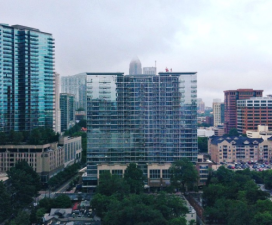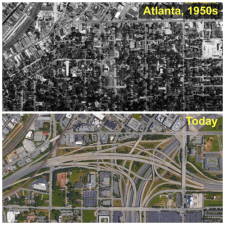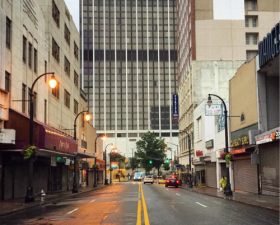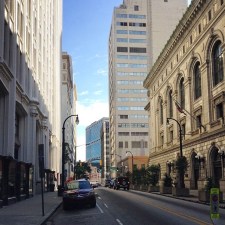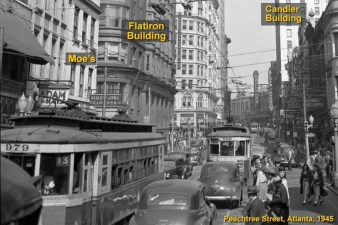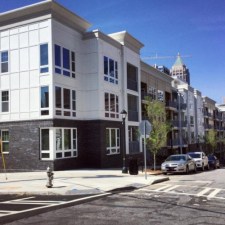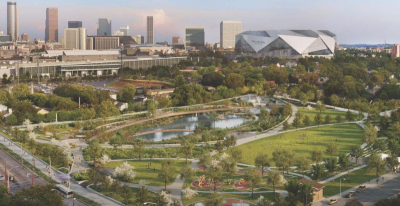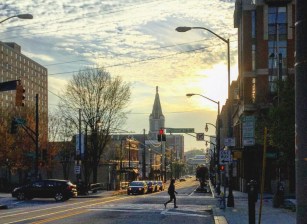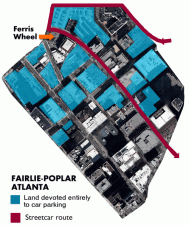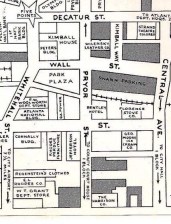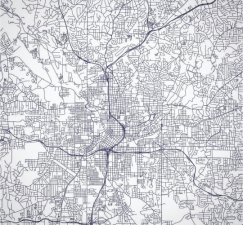ATL Urbanist
Recent Posts
Luxury Housing Dominates in Atlanta, the Most Unequal U.S. City
| | No Comments
Nearly all of the new apartments built in Atlanta in the last couple of years have been in luxury buildings. That means the share of overall housing that’s available for middle-to-low income people is shrinking.
Georgia’s Transportation Plans Affect Atlanta Neighborhoods
| | No Comments
We talk a lot about traffic congestion here, but we also need to address the effect that infrastructure -- and the car trips it generates -- has on city neighborhoods.
This Is the Right Way to Revitalize Atlanta’s South Downtown
| | No Comments
An AJC report on a company named Newport USA reveals that it could very well hold the key to revitalizing a large section of South Downtown.
Is Atlanta’s Skyline Fixation a Sign That We’re Lacking Street-Level Activity?
| | No Comments
The classic image of city life is crowded, lively streets. But the most iconic images of Atlanta tend to be skyline photos, where the streets are out of view.
The Health of Atlanta’s Historic Downtown Has an Effect on the Whole City
| | No Comments
What are we saying to Atlantans and to the world when the cradle of the city is sad and disused?
Is Atlanta Transit Access More Important After the I-85 Collapse?
| | No Comments
The question everyone’s asking, now that the interstate repairs are complete: will a significant number of these new riders stick with transit after the bridge is repaired?
Improving Atlanta Neighborhoods Without Displacing Residents: It’s a Struggle
| | No Comments
We’ve been demonizing gentrification for years with little result. Promoting “housing security” may be a better focus .
Rationalizing Inertia on Atlanta’s Auburn Avenue
| | No Comments
Auburn Avenue, with its architecture and history and connectivity, has the potential to be a vibrant and beautiful signature-street for Atlanta.
Connecting the Dots for Mobility in Atlanta’s Core
| | No Comments
“Atlantans want to drive to Downtown” is a common rationale for the parking blitz in the district. Anti-transit bias, the low price of parking, lack of housing options close to Downtown jobs — all of that plays a part.
Atlanta Has a Walkable Street Grid — We’re Just Not Using It Well
| | No Comments
Downtown is capable of great things with new development and its streets are a part of that; are we creating a place for urban innovation on them?
Transit in a Divided Atlanta
| | No Comments
If we look at the racial segregation of housing in Atlanta’s history, it seems likely that some streets were purposely designed to provide limited connection between black and white neighborhoods.
Last Post
| | No Comments
A couple of years ago, my son was drawing a picture of a city which, as he explained to me, had the ability to fly into space (most everything he starts drawing turns into a flying machine eventually). He said: “this city is a rocket ship!”That phrase stuck with me. In a simple way, it brings to mind a city’s constant movement forward and its potential for achieving greatness. I ended up writing a song about it. I do occasional songwriting and recording these days, but for several years, long ago, I was a serious musician performing and recording with local bands. One of the places I loved performing most was Homage Coffeehouse on Trinity Avenue in South Downtown. The block of buildings where it was located was a grungy spot, pictured in its current state below. It was, and still is, surrounded by a massive and ominous moat of surface parking lots and a couple of large abandoned buildings. (I wrote about this block of buildings in what has fittingly turned out to be my most popular post.) Standing on that street in 1993 and looking around, I became aware that at one time buildings filled all those spaces that are now parking lots. It used to be a vibrant place. The grid of
streets and small city blocks looked like the perfect set-up for
accommodating vibrancy. That gritty and challenged place is where I really fell in love with the city, and where I decided that I wanted to somehow volunteer my time toward helping it become a better place. I think this blog has been a decent start toward that goal. Thousands of people from all over the world visit this website every month to read my posts (I have over 22,000 Tumblr followers). I’ve met several people who’ve moved downtown recently and who told me that my blog influenced their decision. My thoughts have made their way through local and national news outlets for quotes and interviews, giving me a chance to speak about urbanism and Atlanta to a large audience. I’ve even been contacted by major real estate developers asking for advice about the downtown market (don’t worry, I referred them to someone else – I’m no real estate expert). It’s been very gratifying and I thank you all for reading; and a special *big* thanks to the readers who’ve sent me nice messages and emails in the past couple of weeks with kind words about the blog. They were appreciated.A few parting thoughts…This blog’s five-and-a-half year deep dive into urbanism has given me some insight into how placemaking works, and I’ve developed what I think is a fair guess at how things need to unfold in the city for a brighter future. Atlanta will continue to improve as a place because of the the great work being done here by committed citizens, planners and good developers (yes, I have finally learned that there are really good developers out there doing very cool things). But those improvements will be slow and painfully incremental without better leadership. City leaders bend over backwards as they prioritize mega developments like stadiums and corporate relocations. That’s when they bring out the big guns and use all the available municipal tools for making something happen – rezoning, tax breaks, grants, partnerships, fees…whatever it takes. Leaders are likewise capable of prioritizing things like safe streets, blight, disused land near transit stations, geographic segregation of economic classes, the need for comprehensive services for people experiencing homelessness…all of this and more. Those issues should be getting the priority treatment. Atlantans: don’t be afraid to step up and lead with boldness or to support others who will. Stand up to the voices that dismiss ideas about good urbanism by claiming “that won’t work here” or “Atlanta isn’t that kind of place.” A great city is never a single kind of place. It has multiple personalities that all serve a diverse and changing population. Innovations in urbanism can have a positive impact on all those people and help the city roll with the changes in a sustainable way.If a leader tells you that Atlanta is “world class” because it has attractions and offices that appeal to suburbanites, challenge that view. A great city center doesn’t exist to serve suburbs. Instead, it’s a livable place that carefully juggles the needs of residents and visitors together, while prioritizing the former rather than the latter. And that city center has to be surrounded by equitable, vibrant places that compliment each other more so than they contrast each other. Rather than a disconnected collection of neighborhoods of varying health, Atlanta should be a city of strong neighborhoods – ones that invite economic diversity and that fit together with roads that safely facilitate the full range of multimodal traffic.All these moving parts need to be guided by leadership that understands the best and boldest ideas for urban livability and vibrancy. The parts have to move like gears in a big, beautiful machine. A machine that’s like a big rocket. This city is a rocket ship.Your pal,Darin Givens
